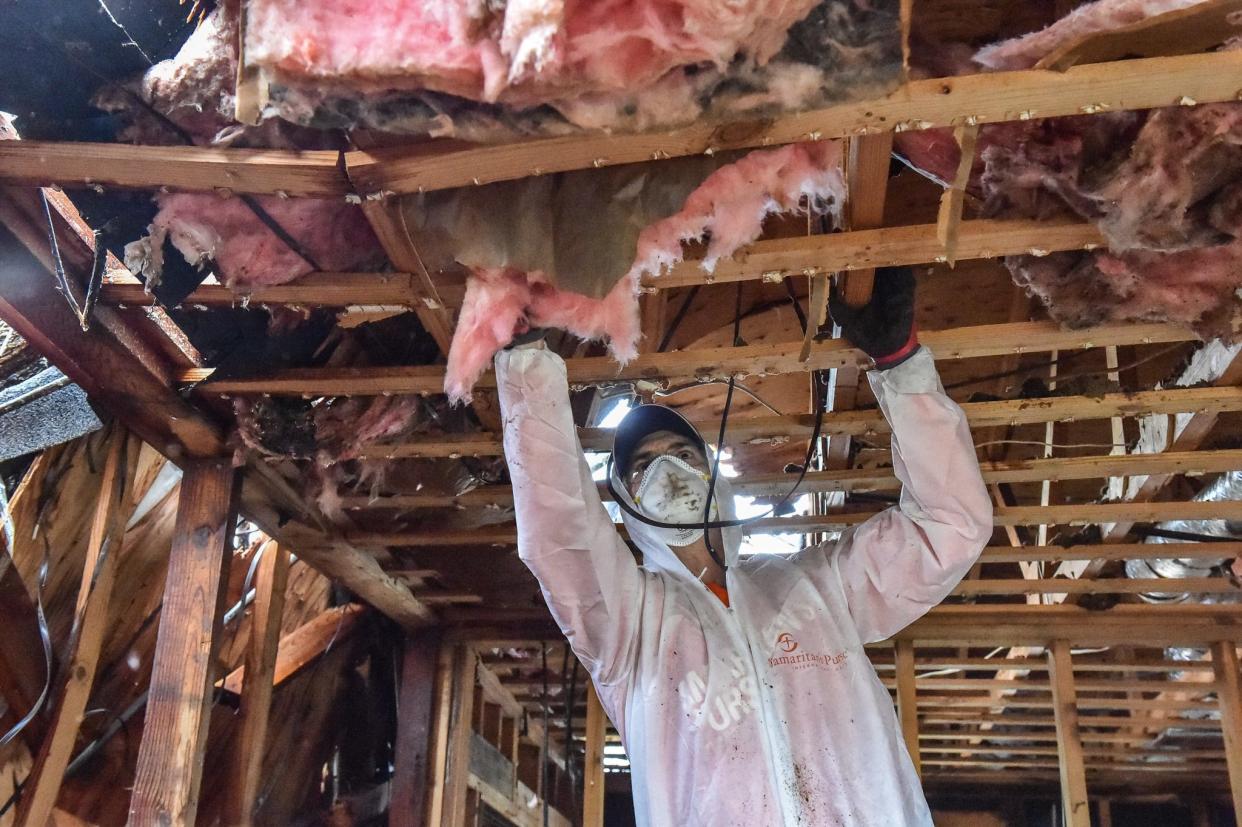Potential health effects possible in Rolling Fork following tornado’s destruction

The American Lung Association is warning residents in the Rolling Fork area of possible health effects from hazardous debris left in the wake of March 24 storms and tornadoes that claimed 21 lives and destroyed or damaged many houses and structures in the region.
"This is especially important to know for the more than 396,000 Mississippi residents that already live with chronic lung diseases like asthma, chronic obstructive pulmonary disease and lung cancer," the American Lung Association states in a press release.
Mold can grow anywhere there is water or dampness, the press release states. Cleaning up affected homes and household items is vital to protecting respiratory health.
The lung association stresses the importance of beginning the cleanup effort as soon as it is safe to return, as chemicals, sewage, oil, gas and other dangerous substances found in impacted areas can pose health risks to area residents.
Dr. Jose Arias Jr., national spokesperson for the American Lung Association, partner at the Allergy Asthma Specialists and associate professor for the University of Central Florida College of Medicine, said when a major storm, hurricane or tornado happens, bacteria from the trees and the ground are carried into the air.
"Residents with allergies and asthma are going to feel the difference after a storm has thrown around possible harmful debris," Arias said. "The changes in the environment could trigger either allergies or asthma episodes. Residents should avoid items and areas of their homes with severe water damage or possible asbestos."
Arias said residents should wear N-95 masks when entering possible affected areas to prevent sickness.
"The ideal situation would be hiring a company that removes mold and asbestos with sensors," Arias said. "Symptoms to be aware of or coughing, wheezing or feeling short of breath and chest tightness or pain."
Below are tips provided by the American Lung Association on how residents in Rolling Fork can stay safe.
How can residents in Rolling Fork protect themselves from hazardous debris?
Protect yourself before returning to your building. During the cleanup, you risk inhaling dust, contaminants and microorganisms, which are unhealthy for anyone to breathe, but especially risky for children, older adults and people with lung diseases.
Wear protective clothing, including gloves, rubber boots N95 mask, to protect yourself from breathing these particles. Note: N95 covers must be fitted and are suited only for adults. Ordinary dust masks cannot provide adequate protection.
Turn off the electricity and gas at the central location during cleanup. In addition, do not use portable gasoline or diesel-powered generators, power washers, grills, camp stoves or other gasoline, propane or charcoal-burning equipment and other devices inside or close to open windows. Those produce carbon monoxide that can kill occupants if it builds up indoors.
How to clean unsanitary surfaces with bacteria?
Use soap and water for cleaning, mainly to scrub mold off hard surfaces.
When in doubt, toss it out! Remove everything soaked by water, including clothing, papers, furnishings, carpet, ceiling tiles and wallboard. Anything that cannot be cleaned and dried and anything porous (like drywall or carpet) saturated from rain for 24 to 48 hours (about two days) must be discarded. Simply drying out water will not remove the bacteria or toxins that can make people sick.
Damp buildings and furnishings promote the growth of bacteria, dust mites, cockroaches and mold, which can aggravate asthma and allergies and may cause you to wheeze, cough and experience other respiratory symptoms.
Consider hiring professional cleaners. If water saturation or flooding occurs, individuals with lung disease should seek help cleaning their homes and workplaces. And suppose more than 10 square feet of your home is flooded or water has been building for more than one or two days. In that case, the U.S. Environmental Protection Agency recommends hiring professional cleaners.
Water brings in nasty residue that may contaminate porous building materials. Mold flourishes in this environment. Attempting to clean without professional help may increase the risk of developing respiratory problems from these exposures.
Is it harmful to burn waste?
Do not burn debris or waste which harms the air. Please take it to a designated disposal area.
If you are worried about your family's lung health and have questions, call 1-800-LUNGUSA to talk to an American Lung Association respiratory therapist.
This article originally appeared on Mississippi Clarion Ledger: The American Lung Association warns Rolling Fork of harmful debris

